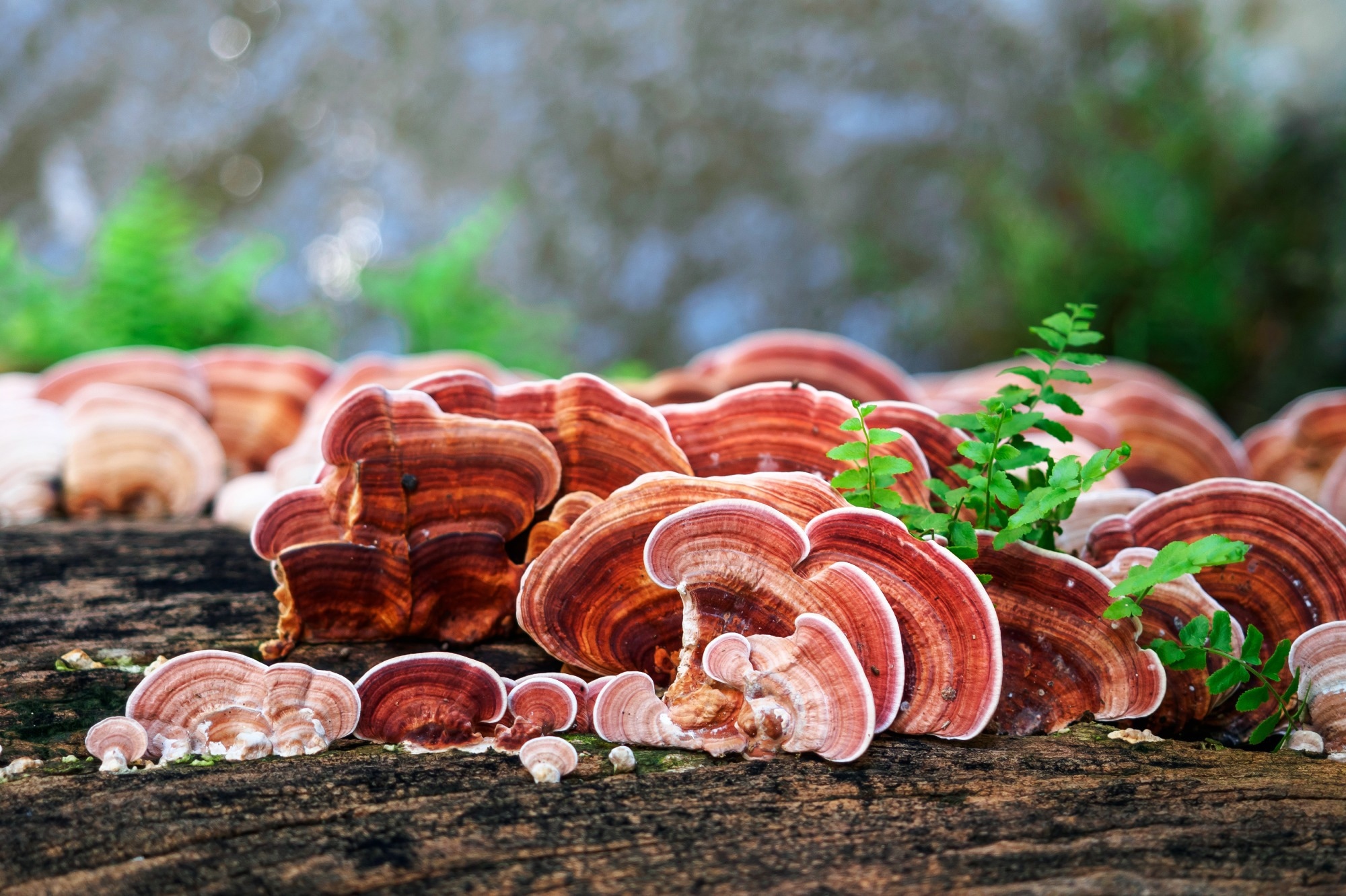Scientists have identified lucidenic acid A, one of the bioactive compounds of Ganoderma lucidum, as a potential inhibitor of severe acute respiratory syndrome coronavirus 2 (SARS-CoV-2) host cell entry. The study has recently been published in the journal Food and Chemical Toxicology.
 Study: Lucidenic acid A inhibits the binding of hACE2 receptor with spike protein to prevent SARS-CoV-2 invasion. Image Credit: sritakoset / Shutterstock
Study: Lucidenic acid A inhibits the binding of hACE2 receptor with spike protein to prevent SARS-CoV-2 invasion. Image Credit: sritakoset / Shutterstock
Background
Chinese traditional medicinal plants are rich sources of many bioactive compounds that exhibit anti-inflammatory, antiviral, antioxidative, and anticancer activities. Regarding antiviral potency, bioactive compounds isolated from about 30 medicinal plants have been found to inhibit coronavirus infection through various mechanisms.
Fungal bioactive compounds, including polysaccharides, terpenes, and cordycepin, have shown antiviral efficacy against coronavirus by modulating immune response and protease activity.
Ganoderma lucidum is a widely-used Chinese medicinal fungus belonging to the Polyporaceae family. Bioactive compounds isolated from this fungus have shown potent immune-enhancing and antiviral activities.
In the current study, scientists have investigated whether Ganoderma lucidum can prevent SARS-CoV-2 host cell entry by inhibiting the interaction between viral spike protein and host cell receptor angiotensin-converting enzyme 2 (ACE2).
Screening of Ganoderma lucidum-derived bioactive compounds
The initial screening of Ganoderma lucidum led to the identification of 54 bioactive compounds and 574 antiviral target proteins. Comparing these targets with SARS-CoV-2-specific targets, 80 anti-SARS-CoV-2 targets were identified from Ganoderma lucidum.
A network model of potential antiviral target genes of Ganoderma lucidum was created, which included the targets related to inflammation, infection, cancer, and other pathways. Based on the activities of identified targets, scientists hypothesized that the bioactive compounds could be used to treat SARS-CoV-2 infection.
The analysis of the target-compound network revealed that each antiviral compound of Ganoderma lucidum can act on multiple targets. Specifically, 54 identified compounds were found to interact with 80 SARS-CoV-2-related targets. Furthermore, these targets were found to associate with 20 different signaling pathways. Among these pathways, the majority were antiviral and anti-inflammatory pathways.
Dynamics of interactions of bioactive compounds
The interaction pattern of identified compounds was determined by docking them separately with human ACE2, wildtype spike-human ACE2 complex, and omicron spike-human ACE2 complex. This led to the identification of lucidenic acid A, which showed a strong binding affinity for all target receptors.
Lucidenic acid A was found to interact with human ACE2 by forming a hydrogen bond, which subsequently prevented the interaction between viral spike protein and ACE2. Overall, these observations indicate that lucidenic acid A can strongly inhibit the host cell entry of wild-type SARS-CoV-2 and its variants.
Antiviral activity of lucidenic acid A
The findings of molecular dynamics simulation revealed that lucidenic acid A makes the spike-ACE2 complex unstable. This further highlights the ability of lucidenic acid A to prevent spike-ACE2 interaction.
Further analysis showed that lucidenic acid A inhibits the binding activity of ACE2 even at low micromolar concentrations. This might be the primary mode of action of lucidenic acid A for preventing SARS-CoV-2 entry into host cells.
Study significance
The study performs a large-scale screening of Ganoderma lucidum-derived bioactive compounds to identify potential antiviral agents against SARS-CoV-2. The majority of identified compounds are triterpenes and sterols, which exhibit antiviral and anti-inflammatory activities.
Molecular docking experiments identify lucidenic acid A as a potent anti-SARS-CoV-2 compound, which exhibits a high binding affinity for human ACE2. Mechanistically, lucidenic acid A inhibits the binding activity of ACE2 at low micromolar concentrations. This subsequently blocks the interaction between SARS-CoV-2 spike and human ACE2.
Notably, lucidenic acid A prevents the host cell entry of wild-type SARS-CoV-2 and its variants, especially omicron.